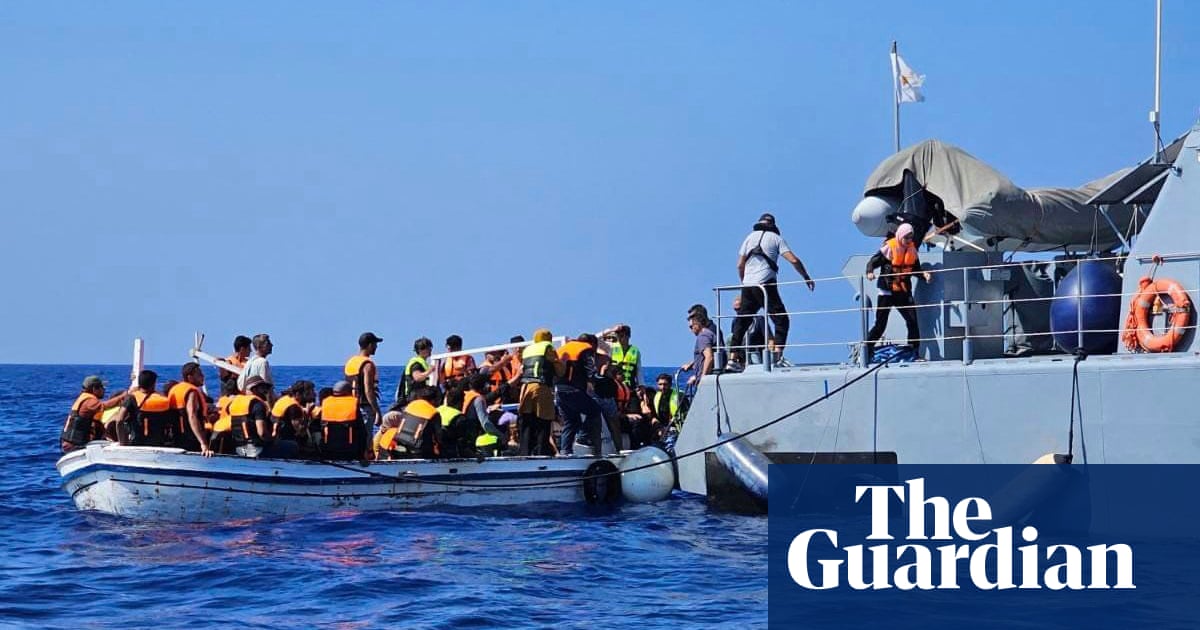The EU must help Cyprus deal with record numbers of Syrian migrants from Lebanon, the island’s government says.
Before a visit to Beirut to discuss the emergency on Monday, Cyprus’s interior minister appealed for support from Brussels, saying the country’s reception facilities were at breaking point.
“This is a cry for help,” Constantinos Ioannou said.
“There has been a very sharp increase [in flows]. We are in crisis mode, reaching our limits.”
Last week 15 boats carrying 800 people made the 10-hour journey from Lebanon, leaving Cyprus in what its president, Nikos Christodoulides, called “a state of serious crisis”.
“Most of those 800 were young males,” said Ioannou. “But they also included nearly 100 unaccompanied children for whom we had to immediately provide guardianship.
“We strongly believe [Lebanon] should be financially assisted by the EU.”
An aid package similar to the €7.4bn (£6.4bn) pact reached between the EU and Egypt last month – also in exchange for stemming flows – should be discussed, he said.
While the idea was “gaining traction” within the 27-member bloc, Ioannou said there was still a way to go.
Christodoulides will press the case when he holds talks with the EU president, Ursula von der Leyen, in Athens on Sunday before flying to Beirut with his interior and foreign ministers.
The EU Commission put its signature to the agreement with Cairo despite facing fierce criticism from human rights groups.
The uptick in arrivals comes amid escalating tensions in the Middle East. Increased hostilities on the Lebanese-Israeli border have shifted the focus of Lebanese authorities away from curbing irregular migration and increased fears of a wider conflagration.
“Lebanon has 2 million Syrian refugees,” Ioannou said. “Authorities there simply don’t have the capacity to manage their borders which is why they need help.”
More than 2,000 people made the 100-mile sea crossing from Syria in the first three months of the year, compared with 78 in the same period last year, according to figures released by the Cypriot interior ministry.
Christodoulides said his government would have to enforce measures that “are not liked” if the influx continued.
For 50 years Cyprus has been divided between a Turkish-occupied statelet in the north and the internationally recognised south, the result of Ankara ordering a full-scale invasion after an attempted coup aimed at union with Greece.
The latest influx follows a dramatic drop in arrivals after Turkish authorities in the north started enforcing stricter visa requirements on students, who regularly crossed illicitly to the south, and the Greek Cypriot government launched a social media campaign to inform would-be asylum seekers about the harsh reality of arriving on an island isolated from the rest of contiguous Europe.
after newsletter promotion
Prior to the decline, Cyprus had exceeded every other EU member state in asylum requests – registering the highest number of claims per capita, which prompted local officials to complain of a disproportionate burden being placed on EU frontline states.
“If you draw a circle around Cyprus you see countries, with the exception of Greece, convulsed by violence, instability and war,” said Hubert Faustmann, professor of history and political science at the University of Nicosia. “The government is very fearful that this influx could turn into a flood given the experience of the past.”
“If the war escalates into Lebanon it will automatically trigger ever bigger refugee flows,” Faustmann added. “It is easy to see how, as an EU Mediterranean border state, Cyprus would push for an agreement with Lebanon much as Greece did with Egypt.”
The Cypriot interior minister said while the island was expanding its capacity to host refugees, with the help of EU funds, it also wanted Brussels to consider declaring parts of war-ravaged Syria safe for repatriation as part of a broader re-evaluation of migration policies.
“We think that 13 years after the [eruption of the] conflict we should re-evaluate Syria, look at safe zones there and legal pathways to relocate citizens to those areas,” he said.
“Refugees, generally, are totally misinformed by smuggler networks about Cyprus. They have no idea Cyprus is out of Schengen [the European area in which border controls are abolished] and think that, once here, they can get a train to Berlin.”
The eastern Mediterranean outpost has long been a haven for people fleeing regional turmoil. Thousands of Israelis flocked to the island within weeks of the 7 October Hamas assault that triggered Israel’s retaliatory attack on Gaza.
Ioannou said with the boat landings showing no signs of waning, the island’s leadership would also discuss offering further technical assistance to combat irregular migrant flows when it visited Lebanon on Monday.







